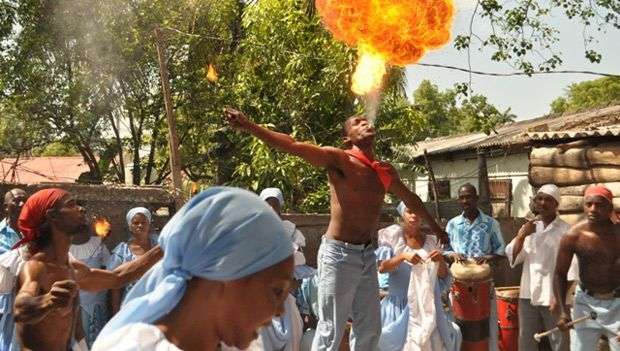On February 7 and 8, 2014, Havana will become the capital of the World Music, in order to “make known the musical diversity of Cuba to the Cubans themselves as well as outsiders,” the general coordinator Havana World Music festival (HWM) , Ismael Sayyad, told OnCuba.
HWM takes hold of the concept known as world music, to create a space in which converge local bands and musical expressions, little played on the island, and groups from other parts of the planet.
As world music people identify traditional or folk music, and ethnic and genres characteristic of cultures around the world. Meanwhile, debates between specialists that place it as a huge genre or market category label.
“The use of this term is somewhat opportunistic. We’re going to take advantage of it because it contains a lot of things, “the artistic director of the event, the Cuban singer Eme Alfonso confessed.
For the production of the HWM, Raquel Avila, the idea is “that musicians work with a base identity, which then merged with music such as rock, funk, jazz … But we have the assurance that is not a thing made in a studio or in a music distributor.”
From Cuba is confirmed the presence of Cossiá, a group founded in 1982 in the eastern province of Guantanamo, which recreates Haitian songs and dances, as well as La Cinta, which, in the town of Baraguá (Ciego de Avila), rescues the calypso, a dance accompanied by weaving colored ribbons on a pole and clustering of bagpipes of the Galician Art Society, with Spanish roots.
Cuban culture has seen their budgets cut from the start of the economic crisis of the 90’s that had a negative impact on the national and international dissemination of cultural expressions outside Havana, according to experts.
In this sense, organizers admitted that the origin of HWM is Para Mestizar , an audiovisual project of
Alfonso that records living cultural expressions that make Cuba’s cultural diversity, among which are the two expressions involved in the festival in attractive and simple communication products.
Groups like Los Van Van and Sintesis also confirmed their attendance and while these may not be considered World Music, “Why not? At a festival in Denmark they are “Alfonso questioned, who dreams to carry the event to other Cuban provinces.
About the invited foreign musicians and groups, Alfonso said they are talking with artists from Norway, Mexico, Spain, Japan, Brazil, Venezuela, Netherlands, Senegal, Netherlands and the UK, and seeing the forms of finance.
“Cuba represents a lot of interest for everyone, all the famous and not famous people we contacted said yes. What we are seeing ways to fund it, “the artistic director of HWM said.
Avila confirmed that “from Norway Thea Hjelmeland will be present to show the results of a project with Cuban musicians that must be recorded soon.” Hjelmeland performed in Havana during the Peace and Love festival, 2013.
Although Alfonso wants to “make it as accurate as possible,” she warned they will have to “be open to people who can finance his trip, people who are willing to not charge for their performances, because organizations that are here are non-profit”.
This is the case of Fuel Fandango, Spanish duo closer to alternative music and pop. “They are a little out of the concept. But they have a lot of quality, their presence encourages the international interest in the Festival and the Cuban public want to have fun, have a good time, “the singer said.
Havana World Music intends to conduct a parallel theoretical event , so that ” the most interesting musicians who have something to contribute musically and visually on music , share it with us ,” Alfonso said.
According to the leader of HWM, “we talked with professionals who can catch up on the state of music in the world , new trends and how you can develop a band in the international market .”
Meanwhile, Avila stressed the idea of becoming “reference space “that can “invite other festivals programmers to also be a window into the music made in Cuba “.
The conference will take place in the capital’s baseball field at the José Antonio Echevarría resort (Calzada and 12, Vedado ), with support from the Cuban Music Institute and the Ministry of Culture of the island, involved from the beginning of the project Para mestizar .
Alfonso insisted in recognizing advances in “Cuban cultural institutions, they are leaving the prejudices and working with other non- Cuban embassies and agencies such as UNESCO and the Swiss Cooperation Fund”.










